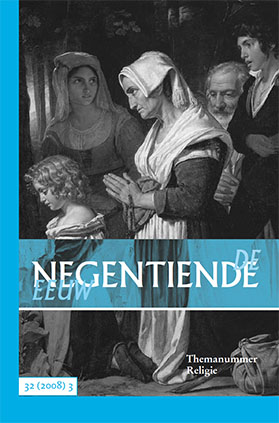André HanouSporen van een Kant-debat in 1807 161-178
Abstract (EN)
Traces of a Kant debate in 1807.A deadly explosion in Leiden (1807) inspired observers to speculate about the meaning of the disaster. Some orthodox Calvinist preachers knew for certain: human sinfulness lay at the bottom of this disaster. This opinion brought freethinkers and Kantians into the fray. They discussed the basis of morality, the worth of Christendom and Kantian philosophy. The Calvinist minister Van Voorst welcomed a public debate and change to defend his kind of Christendom. He tried, in a series of meetings with Kantians (Witsen Geysbeek, Strick van Linschoten, Helmers, Kinker), to persuade them to accept his views. With no succes. Focusing on these debates, this article presents unknown texts and developments, in a later phase of the Dutch Enlightenment (1805-1810).
Hanneke HoekstraHet gestorven kind. Het verdriet van Hendrik de Cock en de Afscheiding van 1834 179-201
Abstract (EN)
The deceased child. Hendrik de Cock’s grief and the Secession of 1834.In the abundant historiography on the 1834 schism of the Dutch Reformed (state) Church, the act of rebellion of the young, orthodox minister Hendrik de Cock has been considered inevitable, whether from a religious or a class perspective. This essay however, foregrounds a biographical element. It concentrates on the sudden death of De Cock’s three-year-old daughter, which affected his state of mind and inspired the courage that enabled him to commit this radical act. This essay points to the examples of the English martyrs of the Glorious Revolution, whose translated biographies de Cock avidly read. These biographies ‘framed’ his religious universe and assigned meaning to his loss.
Jimmy KoppenKatholicisme, liberalisme en vrijmetselarij in onafhankelijk België. Kanttekeningen bij de herderlijke brief van 28 december 1837 202-215
Abstract (EN)
Catholicism, Liberalism and Freemasonry in independent Belgium. Comments on the pastoral letter of 28 December 1837.During the 1830’s, Belgian Freemasonry joined hands with Liberalism in order to oppose clerical dominance. At the same time, Freemasonry tried to come to terms with its own past: especially in Ghent, the Masonic lodges were stil affiliated with the Great East of the Netherlands. In order to stop this Orangist influence, in 1837 the Belgian counterpart established its own lodge, La Fidélité. This act caused an immediate reaction. The Belgian bishops issued a pastoral letter in which they severely condemned every Catholic who was also a Freemason. As a consequence, the Grand Master Goswin de Stassart was forced to give up his political functions, while his deputy, Pierre-Théodore Verhaegen, seized the opportunity to continue to politicize the Masonic Lodges. The pastoral letter had achieved the opposite of its authors’ intentions.
Remieg AertsStand der WetenschapVan beginselstrijd naar verwevenheid. Nieuwe perspectieven op religie, politiek en wetenschap in de
negentiende eeuw 216-230
negentiende eeuw 216-230
Abstract (EN)
From struggle over principles to interconnectedness. New perspectives on religion, politics and science in the nineteenth century.This article reviews recent Dutch scholarship on religion, civil society, politics, and science in the nineteenth century. Over the last 25 years, church and religion as relevant factors in society, have not received the scholarly attention they deserve. The grand narrative of nineteenth-century history traditionally highlights the struggle of church and religion with the growing forces of state and science. Recent scholarship, however, focuses on the persistent relevance of religion to nation building, social and humanitarian action, and scientific debate. Far from being expelled from the spheres of politics and science, religious matters continued to effect processes of nation-building and reached accomodation with scientific and philosophical developments.
Boekzaal der geleerde wereld 231-238
- Jenny Reynaerts, m.m.v. Mattie Boom, Wessel Krul e.a., Der weite Blick. Landschaften Haager Schule aus dem Rijksmuseum Amsterdam. München: Bayerischen Staatsgemäldesammlungen / Ostfildern: Hatje Cantz, 2008. (Jan Jaap Heij)
- Jan de Hond, Verlangen naar het Oosten. Oriëntalisme in de Nederlandse cultuur, ca. 1800-1920. Leiden: Primavera, 2008. (Joep Leerssen)
- Maartje Janse, De afschaffers. Publieke opinie, organisatie en politiek in Nederland 1840-1880. Amsterdam: Wereldbibliotheek, [2007]. (Ton van Kalmthout)
- Marije Vellekoop en Roelie Zwikker, Vincent van Gogh Tekeningen 4. Arles, Saint-Rémy & Auvers-
sur Oise. Zwolle: Waanders, 2007. (Lieske Tibbe) - Van de liefde die vriendschap heet. Briefwisseling Willem Kloos – Albert Verwey, 1881-1925. Bezorgd door Rob van de Schoor en Ilona Brinkman. Nijmegen: Vantilt, 2008. (Lieske Tibbe)
- Marinus van Hattum e.a. (red.), Een eeuw rare kostgangers. Vereniging Het Bilderdijk-Museum 1908-2008. Amstelveen: EON, 2008. (Berry Dongelmans)
- Louis van Tilborg, Van Gogh en de zonnebloemen. Amsterdam: Van Gogh Museum, 2008. (Lieske Tibbe)

